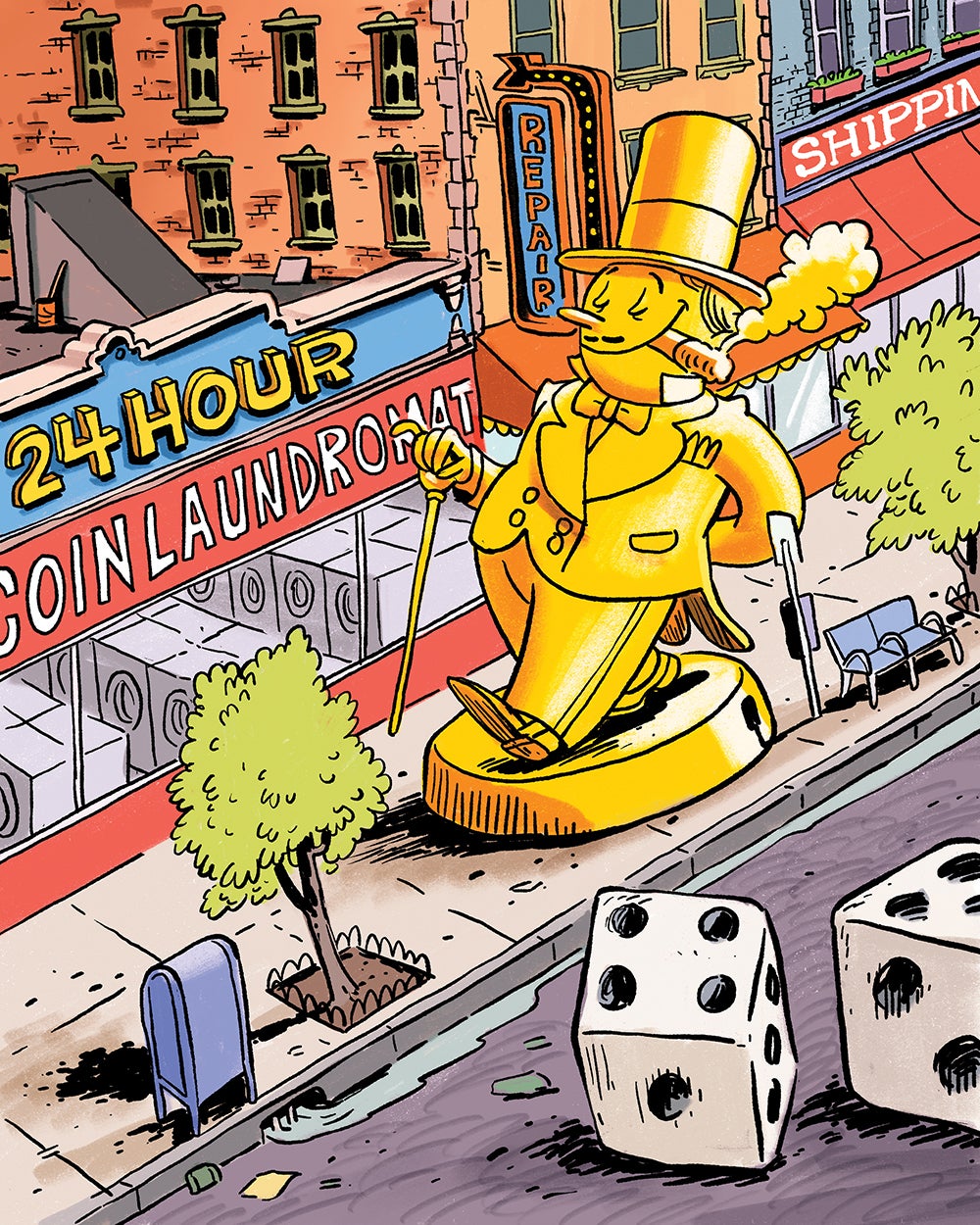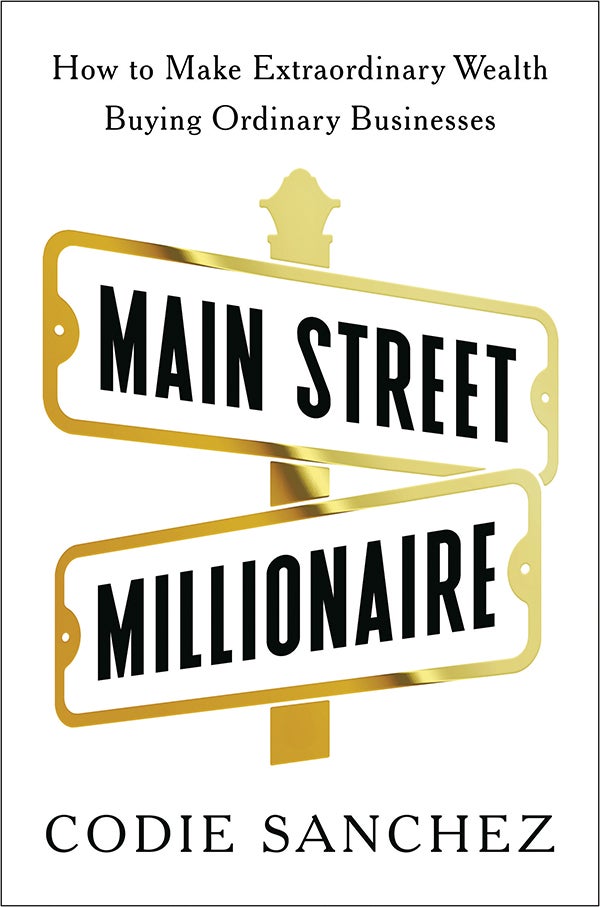I Turned One Business Into 24, Making Tens of Millions — Here's How You Can, Too Here's why following my playbook could be your ticket to financial freedom — and saving America's local small businesses.
By Codie Sanchez Edited by Frances Dodds
This story appears in the November 2024 issue of BIZ Experiences. Subscribe »
I 'll never forget the day I bought a laundromat, nearly a decade ago. It was my first real step toward financial freedom.
As I turned the key and shoved my shoulder into the jammed door, I paused to breathe it all in. That sweet smell of detergent...and mold. Aah! Then the doubts flashed through my mind: Codie, WTF have you gotten yourself into? You know nothing about washing machines. You barely do your own laundry! I batted the thoughts away. For better or worse, everything was about to change — because I had a theory, and I was putting my own money down to test it.
Here's the big idea: Buying Main Street businesses is the most underrated path to wealth. If you do it right and are willing to put in the work, it can not only pay you enough money to quit your job, but also allow you to pay someone else to run it with you. By Main Street businesses, I'm talking about small, local businesses that involve minimal intellectual property and provide a needed product or service — like car washes, laundromats, vending machines, storage centers, repair shops, pack-and-ship centers, and more.
Related: Want to Start a Business? Consider Buying One Instead — Here's Why.
Why are these so valuable? Consider this: Thirty-five percent of boomer-owned businesses have been in operation for more than a decade. Nearly 80% are profitable, with steady, loyal customers. And most of these businesses will end up permanently shutting down. They are too big for their competitors to buy out, yet too small for Wall Street to acquire. So when their owners retire, nobody else will take over. Their children don't want these businesses. Instead, the owners will simply turn off the lights and put the "closed" sign up one last time. Game over…
Unless you buy them.
I committed myself to this idea. I am a mid-30s Latina woman who wasn't born into wealth, and spent years working for financial firms like Vanguard, State Street, and Goldman Sachs. Then I started buying small businesses. I made a modest profit in my first year. Now, less than a decade later, I have a portfolio of 24 Main Street businesses that do tens of millions in revenue, and a fund with companies that do hundreds of millions.
So, by this point, you're probably wondering: How do I find all these mythical owners who might be open to selling?
My answer: The cash goes to the door-knockers, not the mouse-clickers. Buying a business is not like buying a house, where you spend most of your time perusing properties on your laptop. While 90% of homes are sold through online advertising, only about 20% of businesses are. That means despite the growth and popularity of business-selling websites — like bizbuysell.com, loopnet.com, flippa.com, and acquire.com — they are not always the best places to find a good business to buy.
Most business owners are, let's be honest, old. My dad sure as hell is not on Slack or inputting his valuation and uploading his financials onto an online platform. Also, they don't want their employees to know they want to sell. They don't want their customers to know. They don't want to advertise it online because they don't have time to field hundreds of calls from lookie-loos. They are too busy working. In fact, the idea of selling may not ever have occurred to them until you bring it up. This will change in the future as businesses come online, but for now...we go off-market.
Related: Small Business Owners On BIZ Experiencesial Challenges And Strategies

Here are five ways to start
1. Consult the "Four A" club.
That's your accountant, attorney, agent (real estate), and adviser (financial). Call or email them and ask if they know anyone selling a business that's in your wheelhouse. Then ask your friends for the contact info for their accountants, attorneys, agents, and advisers. Rinse and repeat each month with check-in emails.
2. Ask BIZ Experiencess you know.
Fellow business owners are a great source for potential deals. Start with warm leads (people who are your friends) and end with cold leads (local owners you've purchased from before).
3. Find intermediaries.
Intermediaries like bankers, business brokers, and mergers-and-acquisitions advisers are great sources for leads.
4. Join your local chamber of commerce.
These people are literally steeped in local boring businesses. Spoiler: The meetings may make you want to gouge your eyes out. These aren't ragers. But they are full of people who fit your target profile, who show up to nibble shrimp cocktail and drink the house wine. Get to know them.
5. Visit small business development centers (SBDCs).
These are cobweb-filled gold mines of free resources, and they are all over the place. Oregon, for instance, has 20 regional centers and 26 satellite offices throughout the state. SBDCs offer training, market research, and planning. Their Capital Access teams will help you find financing, and their succession planning advisers provide confidential help to owners thinking about retiring.
Related: 4 Strategies to Help You Attract More Local Customers to Your Small Business
You should also adopt what I call "the walking billboard strategy." It has two parts: First, every time you meet someone, tell them you buy businesses. And second, every time you walk into a small business, compliment them on the biz and ask if they own the place. It might go like this: "Hey, I love this place! Do you own it? Cool! I love meeting owners because I actually buy small businesses like this. If you've ever thought about selling under the right terms, obviously. I'd love to stay in touch."
There are only two inputs to the walking billboard strategy: first, the number of owners you meet, and second, the number of people who know you buy businesses. Increase either of those (ideally both) and you will eventually have so many potential deals it'll startle you.
Now here's the most important part: There is often an emotional component to these sales. Do not be a "millennial-splainer."
Don't tell business owners all the reasons you will run their business better than them. Don't come in hot with the "facts" on what their business is worth. Don't talk about the new tech and your superiority due to your financial wizardry. Your mantra is going to be "shut up and listen." The business may have been in one family for a generation or more. The owners may not be as interested in money as they are in their legacy, their family name. They want the business to go to the right person—someone who will respect and take care of their employees and customers and maintain the quality the business is known for. Developing a relationship with them and convincing them you will do those things is crucial.
If you can do all this, your freedom awaits. You could preserve their legacy, serve your community, gain financial freedom, and help save America's Main Street businesses. None of this is rocket science. It's a simple process that you can successfully execute, so long as you remain committed to becoming an owner. I wish you the heartbreakingly beautiful feeling of being in charge of your own destiny. There's nothing quite like it. Even if it sometimes smells like mold.
Related: Dear Business Owners: It's Time to Work on Your Business, Not in It

Adapted from Main Street Millionaire: How to Make Extraordinary Wealth Buying Ordinary Businesses by Codie Sanchez, in agreement with Portfolio, an imprint of Penguin Publishing Group, a division of Penguin Random House LLC. Copyright © Codie Ventures LLC, 2024.











